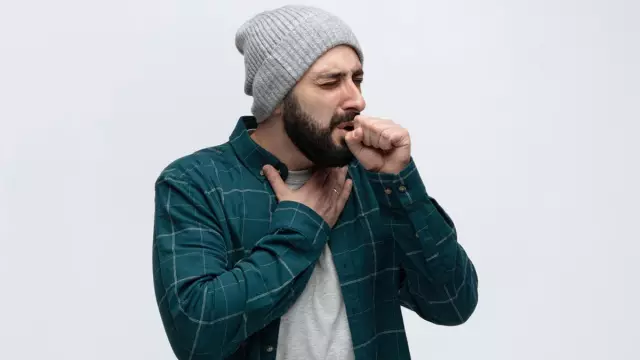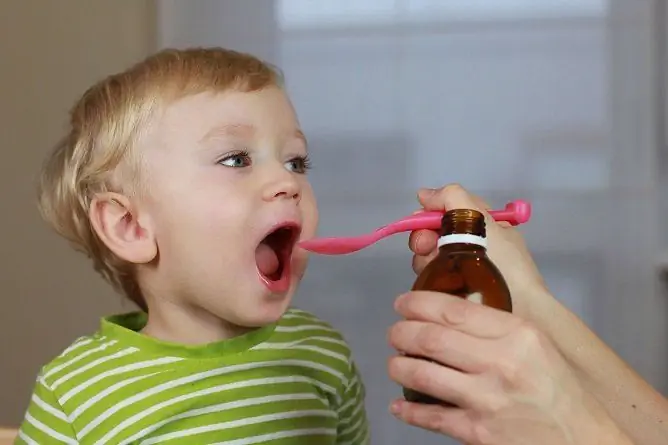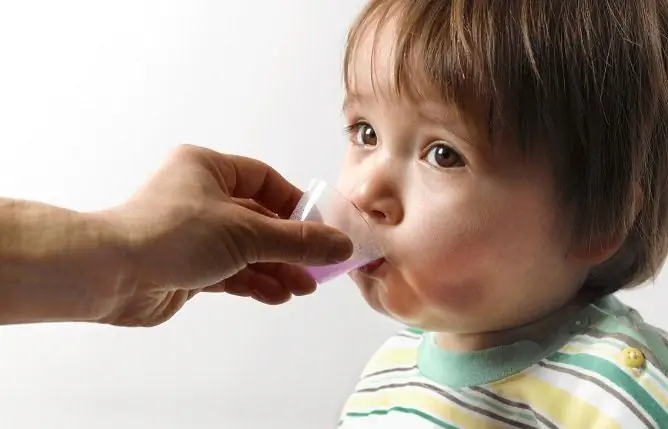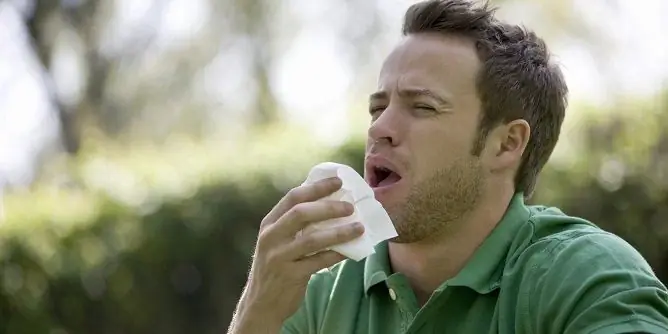- Author Rachel Wainwright wainwright@abchealthonline.com.
- Public 2023-12-15 07:39.
- Last modified 2025-11-02 20:14.
A child's cough before vomiting: what to do, reasons when to call an ambulance
The content of the article:
- Reasons why a child develops a cough before vomiting
-
What diseases cough up to vomiting occurs in children at night
- Laryngitis
- Bronchial asthma
- GERD
- Why do babies have a cough before vomiting?
- The child has a cough before vomiting: what to do?
- When you should immediately consult a doctor
- Dr. Komarovsky on the treatment of cough with vomiting in children
- Video
A child's cough before vomiting is a very unpleasant symptom, both for the baby himself and for his parents. It can be observed in many pathological processes.
Sometimes this condition occurs sporadically and does not require medical care - most parents encounter this type of cough in a child at least once. But if a paroxysmal cough, accompanied by vomiting, recurs often or lasts a long time, then the child should be shown to the doctor for the necessary examination and therapy.

If the child has a cough with vomiting repeatedly, an examination is necessary
Reasons why a child develops a cough before vomiting
Cough is a protective reflex aimed at clearing the airways from microbes, mucus and foreign particles (dust, food pieces) that have accumulated in them.
The mechanism of coughing is based on irritation of the receptors of the mucous membrane of the airways. This irritation is transmitted along the nerve fibers to the cough center of the brain, and then a command is sent from it to the muscles of the walls of the bronchi, chest, diaphragm and abdominal press for a simultaneous contraction. This leads to a rapid, sharp exhalation through the mouth, that is, to a cough thrust. The air stream comes out with force from the bronchi and carries out phlegm particles with it.
The most common causes of coughing with vomiting in children are:
| Cause | Explanation |
| Acute respiratory viral infections (ARVI) |
This group of diseases is characterized by the development of rhinitis (runny nose), accompanied by profuse mucus (snot). If the child does not blow his nose in a timely manner, then this mucus accumulates in the nasopharynx, which provokes a strong coughing attack |
| Acute stenosing laryngitis (false croup) | This disease is characterized by a rough barking cough, as well as shortness of breath. |
| Foreign body in the airways (throat, larynx, trachea, or bronchi) | - |
| Endocrine system diseases (thyroid hyperplasia, thymomegaly) | An enlarged thyroid or thymus (thymus) gland presses on the trachea, causing the child to have violent coughing fits |
| Psychological problems | During a tantrum, the child experiences significant tension in the vocal cords, as a result of which a paroxysmal cough with vomiting may occur |
| Damage to structures of the brain (tumors, hydrocephalus) | This type of cough is called neurogenic. |
| Gastroesophageal reflux disease (GERD) |
At the heart of this pathology is the weakness of the sphincter located between the stomach and the esophagus. When the baby is in the supine position, the acidic contents of the stomach flow into the esophagus, which irritates its nerve receptors. This phenomenon provokes the onset of cough and vomiting reflexes. That is, in this case, the cough should not be treated, but GERD |
Whooping cough is another common cause of a child's severe cough before vomiting. Numerous refusals by parents to conduct routine vaccination of children, unjustified medical withdrawals have led to a significant increase in the incidence of this infectious disease.
The causative agent of whooping cough enters the child's body through the respiratory tract. In the course of its life, it produces toxins that form a cough dominant in the brain. It is difficult to interrupt it even after the body has coped with the pathogen. Therefore, a characteristic symptom of whooping cough is a dry, paroxysmal cough at normal body temperature.
The attack often occurs at night - the child suddenly wakes up from a severe cough, his face turns red, and tears may appear in his eyes. A series of cough thrusts is interrupted by a characteristic wheezing breath called a reprise.
What diseases cough up to vomiting occurs in children at night
If a child has bouts of coughing with vomiting mainly at night, then stenosing laryngitis, bronchial asthma and GERD should be excluded.
Laryngitis
With laryngitis, children develop swelling of the laryngeal mucosa, which is accompanied by a rough cough, hoarseness and shortness of breath. During sleep, the mucous membranes dry out, resulting in a sore throat and an attack of severe coughing.
Bronchial asthma
At night, the vagus nerve, which innervates the bronchi, is activated. This can provoke severe bronchospasm and a related attack of bronchial asthma.
GERD
With GERD, as noted above, in the supine position, gastric juice is thrown into the esophagus. This process is accompanied by the appearance of heartburn, nausea and vomiting, and coughing.
Why do babies have a cough before vomiting?
Cough before vomiting can be provoked in children of the first year of life:
- improper feeding of the baby (overfeeding, early introduction of complementary foods without taking into account the age of the baby);
- aerophagia - swallowing a significant volume of air during breastfeeding or bottle feeding;
- teething - at this time, the secretion of saliva increases, which accumulates in the oropharynx, irritates the receptors in the mucous membrane and the root of the tongue, which causes cough with vomiting;
- postnasal drip - with a runny nose, mucus from the nose flows down the back of the pharynx, provoking a cough.
A cough accompanied by vomiting can develop against a background of various respiratory diseases. Only a doctor can identify its cause and prescribe the correct treatment. Self-medication in this case is unacceptable.

In infants, coughing with vomiting can be caused by swallowing large amounts of air during feeding.
The child has a cough before vomiting: what to do?
If the child coughs up to vomiting, he needs help, rather than waiting for the seizure to end spontaneously. First of all, you should ensure the flow of fresh air into the room and its humidification. Often these measures are sufficient to interrupt the attack.
If this does not happen, then, as prescribed by the doctor, the child has antitussive drugs with a central or peripheral mechanism of action. In some cases, antispasmodics have a good antitussive effect, but their use is also possible only as directed by a doctor.
In case of bronchitis, in order to prevent the occurrence of repeated attacks of coughing with vomiting, inhalation is performed using a nebulizer with saline, mineral alkaline waters or mucolytic solutions.
To prevent the onset of coughing attacks against the background of GERD, the child should be fed no later than 4 hours before bedtime. In addition, the head end of the bed is raised, and, if necessary, medications are prescribed that regulate the motor function of the gastrointestinal tract.
Parents should understand that the reasons for the onset of a paroxysmal cough that ends with vomiting can be different, therefore there is no universal medicine or method of treatment.
Only a doctor, after carrying out the necessary examination, can make the necessary appointments. The examination plan, depending on the specific clinical situation, may include:
- general and biochemical blood test;
- bacteriological examination of a smear from the throat and blood for whooping cough;
- FEGDS;
- radiography or fluoroscopy of the lungs;
- bronchoscopy;
- Ultrasound of the thyroid gland and thymus;
- determination of hormonal status;
- computed tomography of the brain;
- consultations of narrow specialists (pulmonologist, neuropathologist, gastroenterologist, allergist, endocrinologist).

In many cases, a cough with vomiting does not require treatment, but a doctor's consultation is necessary
When you should immediately consult a doctor
If a child, against the background of acute respiratory viral infections or bronchitis, has a single attack of coughing with vomiting, provided there is no pronounced intoxication, weight loss and loss of consciousness, then there is no particular reason for concern. In this case, the parents need to continue the treatment prescribed by the doctor and closely monitor the general condition of the child.
You should urgently seek medical help if at least one of the following signs appears:
- prolonged suffocating cough, combined not only with vomiting, but also with signs of respiratory failure (shortness of breath, cyanosis of the nasolabial triangle, participation in the act of breathing of the auxiliary muscles);
- the appearance in sputum or vomit of even minor blood impurities;
- increasing dehydration (decreased turgor of soft tissues, dry skin and mucous membranes, severe thirst, decreased urine output);
- high body temperature, which cannot be reduced by taking antipyretic drugs in age-specific dosages.
Dr. Komarovsky on the treatment of cough with vomiting in children
Pediatrician E. O. Komarovsky, well-known in many countries of the post-Soviet space, believes that children should not be cured of a cough, but the underlying disease that caused its development. The doctor recommends:
- maintain the necessary microclimate in the sick child's room (air humidification, airing the room);
- take daily walks with him (subject to normal body temperature);
- plentiful drink;
- exclusion from the diet of foods with high allergenic properties (citrus fruits, eggs, fresh milk, cocoa, chocolate, strawberries);
- conducting etiotropic (antiviral and antibacterial drugs) and symptomatic (antipyretic, expectorant) therapy as prescribed by the attending physician;
- regular removal of accumulated mucus from the nasal cavity and mouth;
- inhalation with a nebulizer.
Video
We offer for viewing a video on the topic of the article.

Elena Minkina Doctor anesthesiologist-resuscitator About the author
Education: graduated from the Tashkent State Medical Institute, specializing in general medicine in 1991. Repeatedly passed refresher courses.
Work experience: anesthesiologist-resuscitator of the city maternity complex, resuscitator of the hemodialysis department.
Found a mistake in the text? Select it and press Ctrl + Enter.






